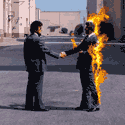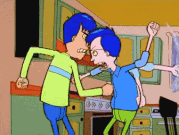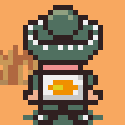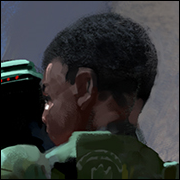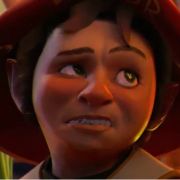|
Ither posted:I usually write in Courier New, but for this attempt, I'm using Comic Sans. Mods!?
|
|
|
|

|
| # ? May 12, 2024 22:22 |
|
LiterallyATomato posted:Mods!? Yes, the mod forums are all in comic sans
|
|
|
|
I write in Garamond, it feels like a finished product
|
|
|
|
I write in Comic Sans whenever I get mired down in details like ‘good grammar’ and ‘word choice’ and I really just want to get poo poo done.
|
|
|
|
newts posted:I write in Comic Sans whenever I get mired down in details like ‘good grammar’ and ‘word choice’ and I really just want to get poo poo done. Never let words get in the way of a good story - Kurt Cobain
|
|
|
|
I finished chapter one. About 2,000 words. The story is a modern day progression fantasy. The MC is a wizard, and the main focus of the book is seeing him grow in power. Writing feels different this time. I think I'm going to make it. Or at least break my previous ceiling of 15K words. Fight scenes are one of the worries I have though. Some people want them to be brutal and short. Others want a very detailed description. I have to figure out what I enjoy about them and write that.
|
|
|
|
Congrats on hitting a mental "I might make it" point with a story, that's always good and cool.Ither posted:Fight scenes are one of the worries I have though. You're absolutely right that you gotta figure out what you enjoy and write that--I'd just have to encourage that if you are using other people's wants and likes to shape your own choice, you at least agree with why they say they want/like these things. It's pretty easy, especially when you're not used to writing full length books/stories, to get caught up in trying to appease strangers in a way that really can hold you back if you're not in agreement with what they say they want.
|
|
|
|
Would you say that as a part of the whole 'read books in order to improve your writing' thing, that it's important to also read mediocre and even bad books, as a what-not-to-do exercise?
|
|
|
|
Junpei posted:Would you say that as a part of the whole 'read books in order to improve your writing' thing, that it's important to also read mediocre and even bad books, as a what-not-to-do exercise? Yes, but it's more of an inspiration thing, in a "this sold for actual money? poo poo, even *I* could do that". https://www.youtube.com/watch?v=rCOmkrwQdFc
|
|
|
|
Junpei posted:Would you say that as a part of the whole 'read books in order to improve your writing' thing, that it's important to also read mediocre and even bad books, as a what-not-to-do exercise? I don’t think it’s worth seeking them out, but unless you’re some sort of wizard you’re going to end up reading books you don’t like. It’s worth identifying the *why* of that.
|
|
|
|
ultrachrist posted:I don’t think it’s worth seeking them out, but unless you’re some sort of wizard you’re going to end up reading books you don’t like. It’s worth identifying the *why* of that. And you're an archmage if you can actually finish them. It sounds fun in theory but I've had to DNF a few books I was excited for because they weren't good, and finishing a book I really didn't like makes me feel like I wasted my time even if I did learn from it (I guess)
|
|
|
|
Junpei posted:Would you say that as a part of the whole 'read books in order to improve your writing' thing, that it's important to also read mediocre and even bad books, as a what-not-to-do exercise? It really depends on where you’re at—like if you still need reassurance you’re not that bad or whatever. If you enjoy reading bad books and picking them apart, then sure, but I’ve found over the years I’m quicker to DNF something that doesn’t grab me because I’ve lost patience for that kinda thing. Sometimes a book that started out well will drop the ball—I’ll finish those because analyzing why a story failed is more useful to me than why the prose sucks (something that’s evident on page one). I think it’s way more important to read stuff you think is good that broadens your horizons to show you what you can do, like what breaks the “rules” and how other authors made that work. I know people who’re afraid of reading anything “difficult” and would rather bask in the warm comforting glow of other people’s mediocrity, and I’ve noticed over the years those people never grow
|
|
|
|
Junpei posted:Would you say that as a part of the whole 'read books in order to improve your writing' thing, that it's important to also read mediocre and even bad books, as a what-not-to-do exercise? Some folk like/need the ego trip, like Stuporstar said. Some folks like to spite-write and take ideas executed in ways they don't vibe with to the conclusions they think things should have been done. I don't like reading poo poo I don't like, it makes me fall out of excitement for books, so I don't do it. poo poo's totally up to you.
|
|
|
|
One reason why focusing on crap to pick apart can stunt a writer’s growth is if you’re looking at what not to do, you’re filling your head with a bunch of “don’ts” instead of finding good examples of exceptions. Every “don’t” or “never do x” you internalize is creating a tighter and tighter straightjacket for your own writing.
|
|
|
|
That’s a great point. Don’t think of them as what NOT to do, but as lessons for ‘the way this author did this didn’t work.’ For every rule that says DON’T, there’s a bunch of successful works that DID. It’s all in the execution.
|
|
|
|
Re-reading good stuff is far better than reading mediocre stuff IMHO.
|
|
|
|
Thanks for that, was just broadly curious, good to know. Anyway, this is a very specific piece of wild advice I find that might not be usable by everyone, but I figured it would help someone. It's advice for writing a character that uses a cane (written by an IRL cane user). https://www.tumblr.com/fernshawart/690404767760023553?source=share
|
|
|
|
I've got a question for all the people in this thread with experience of querying agents (of whom there seem to be quite a few.) I have a novel that's in its third draft. I'm very proud of it and I think it's great. It's about 135k words, and I don't think it will be possible to cut it down by more than a few thousand. Someone on Discord has told me that this is too long for a debut fantasy novel and it would really need to be in the range of 80-110k to have a chance of selling. They did suggest I might be able to pick out certain agents that are willing to read longer manuscripts by looking at their stats on QueryTracker. I am right at the beginning of trying to get this book published and I don't know much about querying beyond what I've gleaned from browsing this thread. Part of me wants to just say gently caress it and self-publish, but obviously this comes with many challenges of its own. What I want to know, before I commit significant time to studying querying, writing my synopsis, etc, is whether the length of the book is going to be an insurmountable hurdle. I know that trying to get a trad pub deal is something like a one in a million shot. I just don't want to waste my time if it's a zero in a million shot, if that makes sense.
|
|
|
|
I sold my first around 110 and it crept up to around 140 in edits. Of course that was ten years ago (sob). I’ll ask my agent friends but my feeling is most fantasy books are already longer than 140? Paper has gotten way more expensive though. They really do like short stuff.
|
|
|
|
My manuscript was 180~ and it was too long despite being well-paced in some of the feedback I got. I've heard that going above 120 is going to make things way more difficult these days. The general rule of thumb I've heard is to not go about 100 for a debut, but I have less experience in querying than others!
|
|
|
|
|
Agent friend says 140k is “fine”. She just asked to read the full of a manuscript that’s 200k which will “definitely need some cuts”. Single data point but better than nothing I guess.
|
|
|
|
The quality of both the query and the manuscript it represents are more important than raw word count. Some agents will throw away a query over the word count but I’m not aware of that being super common. If they love what they’re reading, you’ll get a request for the full regardless of whatever else.
|
|
|
|
Can't you just split it into two 70k books, or is that too short?
|
|
|
|
|
Sailor Viy posted:I am right at the beginning of trying to get this book published and I don't know much about querying beyond what I've gleaned from browsing this thread. Part of me wants to just say gently caress it and self-publish, but obviously this comes with many challenges of its own. Good luck with querying! I'm seeing a lot of trad pub authors adopt indie strategies like self-pubbing a free novella as a reader magnet to build their readership. Stephen Aryan is the latest in the list of trad pubbed authors dipping their toes into hybrid, though I don't think he's gone on record about what, exactly, he's planning to self-pub (per his latest update on YouTube, it sounds like it's gonna be a full series with exact length, etc TBD). IIRC Brian McClellan self-pubs all his novellas and Mark Lawrence has done the same with one of his novellas. So, basically, regardless of what happens with querying (and keeping self-pub as your backup route in mind), I would start working on that reader magnet prequel as your next project. Getting that out there is going to make self-pub a LOT easier for you, and it can't hurt you if you end up getting a trad pub deal. SimonChris posted:Can't you just split it into two 70k books, or is that too short? Having read the book in question, it is most definitely not splittable. (Also I will be extremely sad if anything in the book gets cut because I love it to pieces as it is currently written.)
|
|
|
|
SimonChris posted:Can't you just split it into two 70k books, or is that too short? I think readers would get angry if they got halfway through a story and ran into a paywall. Also publishers rarely do two books in rapid succession unless it's, I dunno, Annihilation. The sales dropoff from part 1 to part 2 would probably be quite large (it always is with sequels, but this is a book that wants to be one story).
|
|
|
|
I'm taking a break from my WIP to finish a short story I began last year, and I feel like it's in a great place even before I start editing. I really want to shop it around and get it published somewhere, but the more I write, the more I find myself enjoying the world and characters and kind of want to expand it out into a full-length thing afterward. How does this like... work. I can think of a few instances where it's happened before but have no clue how rights etc works in that regard, since part of the book would have been previously published already?
|
|
|
|
You can publish a short story and then publish a book based on it as separate things. It's fine. My first novel was based on my first short story. Unless you're working with complete assholes, I guess. Read the contract for your short story to make sure they don't try some ridiculous rights grab. But you should be fine.
|
|
|
|
General Battuta posted:You can publish a short story and then publish a book based on it as separate things. It's fine. My first novel was based on my first short story. Sick. Thanks!
|
|
|
|
Can someone shoot me a discord invite
|
|
|
|
Done.
|
|
|
|
Sailor Viy posted:I have a novel that's in its third draft. I'm very proud of it and I think it's great. It's about 135k words, and I don't think it will be possible to cut it down by more than a few thousand. Someone on Discord has told me that this is too long for a debut fantasy novel and it would really need to be in the range of 80-110k to have a chance of selling. They did suggest I might be able to pick out certain agents that are willing to read longer manuscripts by looking at their stats on QueryTracker. I think people get too hung up on word count. I'm doubtful an agent will automatically bin a query for a fantasy novel of that length, and if they do, it's probably because they don't want to work on revising a novel that long, so they wouldn't be the right fit for you anyway. That's what, 450 pages? Bog standard for the genre. I'm on sub with a 200k epic fantasy right now, and while we've gotten a few passes, not a single one has mentioned word count. 135k is not an unsellable length at all if the writing is compelling; at worst, it might make finding representation and making a sale a hair more challenging but certainly not impossible. TL;DR you're fine imo. tiniestacorn fucked around with this message at 23:45 on Sep 28, 2023 |
|
|
|
Thanks for the advice, everyone. I think I'll take a crack at querying.
|
|
|
|
Yeah, I’ve never really understood the “80-110k for debut fantasy/sci fi” idea since I feel like half the debut genre novels I see in bookstores are very obviously longer than that.
|
|
|
|
I think people see the ‘first fantasy novels typically fall in this range’ and take it as a hard limit. Unless the publisher has a hard limit for everything (like limited space in a magazine), there are always exceptions. Although I can see that the more you go over or under that range, the more risk you have of not being read. If you send someone a 500k novel as a total unknown, it better be the most compelling page turner they’ve read in a long time. I think a lot of publishers would see that in a query and just pass. But I doubt anyone gives a poo poo if you go 5k - 20k over the typical range, really as long as it’s necessary to the story.
|
|
|
|
I mean, there definitely are agents and agencies that have hard limits. Like it's not a universal thing, but as an example, pretty much everyone at Book Ends has hard "go past x number of words, I won't even read the query" limits (for epic fantasy there, that limit is 120k). Plus, there's a bunch of agents lately who've been putting "I want shorter stuff please I can't cope with a doorstop" on their MSWL. It's not a death sentence to a novel, nor is it something to worry TOO much about (as if you write chonkers, you probably want an agent who wants to read chonkers) but it very much is A Thing.
|
|
|
|
Longer stuff is also more expensive to print which is a factor with all the supply chain issues/paper price spikes going on rn.
|
|
|
|
General Battuta posted:Longer stuff is also more expensive to print which is a factor with all the supply chain issues/paper price spikes going on rn. And sometimes you end up with extremely tiny print on cheap paper as a consequence, which sucks. My gf and I both just reread The Secret History and the tiny font bothered the hell out of both of us
|
|
|
|
It's been quite a while since I've read this thread, largely because I tried to forget about writing and took a long break. So I took a little while to catch up on the last 50 or so pages of the thread. In my current WiP, I originally tried starting diving right into the action, with an attempt on my heroine's life in the middle of a big public speech (the Inciting Incident), then only after that, to do some major character introductions and a flashback. I recently saw something on story structure where the very first part is noted as the Exposition which should set up what counts as "normal" for the protagonist. It sounded reasonable, so I rolled the clock back a bit to 3 or 4 hours before the assassination attempt to do some exposition and setting stuff there. It didn't really change the opening line much, I wasn't starting out at the literal moment of the attack, but a few minutes earlier. In terms of a sense of immediacy I don't really think there's a lot of difference between: A) "The first attempt on my life occurred just as I was about to grossly breach royal etiquette before a crowd of the general public," and B) "Three hours before the first attempt on my life, I finished my speech — going into graphic and explicit detail — about precisely where the King could shove his stupid idea." However, there are two things about this change I now have to consider. The first is that a reader is not going to immediately know who major, minor and walk-on characters are if I give them all names. Is the best way to handle that to just not name some of the background characters (even if she would likely know their names)? Example posted:“My pardon, your Highness, it can be so hard to concentrate with a stomach which is practically empty,” said a councilor sourly. The second thing is that I now need to add in a Goal and a Conflict for this brand new chapter which didn't exist before. I'm a little fuzzy on that, but I guess her goal would probably be to try and get into position to give the speech without being stopped or talked out of it. *** Re: Reading Bad Books. I recently read a book I could not finish, and skimmed partway through, just enough to get what the authors were trying to do. It's a murder mystery, where the target is an rear end in a top hat Victim, except in this case, the protagonist was the intended target. I stopped reading it long before the murder because the protagonist was insufferable. She was too shallow, self-absorbed and in my opinion, too unobservant to credibly be 'the detective' who cracks the case. I mean, congratulations for trying something unique, authors, but it was not enjoyable being exposed to someone like that for the 52 pages I managed to get through. Re: Picking apart bad books The first and best book on writing that I ever read was "How NOT to Write a Novel." To quote the book, "we do not propose any rules; we offer observations. 'No right on red' is a rule. 'Driving at high speed toward a brick wall usually ends badly' is an observation." It gives cautionary (and very humorous) examples of things which often don't work and explains the reasons why they often don't work. It doesn't say "this never works," it acknowledges that there are many successful examples of these guidelines which get broken successfully. General Battuta posted:I think readers would get angry if they got halfway through a story and ran into a paywall. This is kinda what happened with me and Velocity Weapon by Megan O'Keefe. That book had three protagonists. The problem I had was that one-third of the book, the third protagonist, was completely unrelated to anything going on with the other two protagonists, and was in fact in an entirely different star system. I kept waiting and waiting and waiting for it to become relevant, but it never did, it was just there to occupy space and act as a "guess you have to buy book 2 to see how this matters!" It didn't help that said third protagonist was one of the most clueless, ignorant idiots I've ever seen on the page. I was so put off by 1/3 of the book feeling so disconnected with the rest that I didn't buy the sequel. Stabbey_the_Clown fucked around with this message at 00:41 on Oct 8, 2023 |
|
|
|
Stabbey_the_Clown posted:In my current WiP, I originally tried starting diving right into the action, with an attempt on my heroine's life in the middle of a big public speech (the Inciting Incident), then only after that, to do some major character introductions and a flashback. I recently saw something on story structure where the very first part is noted as the Exposition which should set up what counts as "normal" for the protagonist. It sounded reasonable, so I rolled the clock back a bit to 3 or 4 hours before the assassination attempt to do some exposition and setting stuff there. Personally speaking, I'm not the biggest fan of in medias res openings because more often than not, I just don't care yet and I don't appreciate having to exert a higher than normal amount of mental energy to comprehend what the hell is going on for the sake of characters/a situation I don't know yet. Furthermore, there's the issue that you mentioned above in that you don't first learn what is ordinary/normal for the character/setting/state of things before you are thrust into the thick of it and therefore miss context for comparison. Just going off the B-version of the first line, I feel it kind of defeats the establishment of the ordinary state by telling you what the inciting incident is first thing. It also seems like it's preemptively removing any tension there might have been in the lead-up to the actual assassination attempt. I mean, I'm sure it's probably obvious to the reader what's going to go down (if they read the blurb), but perhaps it's not immediately obvious it was THIS speech she's about to give during which the attempt occurred. The heroine going about her prep routine to give this speech is an establishment of the ordinary. Has she done this before? What is the speech about? She probably cares a lot about the issue she's going to speak about (what she cares about tells me something about her), and surely the issue is important to the greater plot/establishing the state of the world/setting as the story begins. When she gets up on the stage, does she get a weird vibe from the crowd? Does she have a bad feeling? I think you can focus the opening on her making her speech and ratchet up the tension/let non-ordinary things/observations seep in and build. The reader no doubt knows that something is going to wrong/there will be an attempt on the heroine's life (since it's highly likely it'll be mentioned in the blurb), so they're anticipating that something is going to go down. Sometimes it's fun for the reader when they know bad poo poo is about to happen but the character doesn't, (I mean, she didn't at the time, but does in this apparent retrospective narrative framing which may or may not color/bias the retelling) and since you're arriving at the bad poo poo pretty quickly, it's not going to feel dragged out/overly coy. Kinda got rambly - hope that makes sense. quote:However, there are two things about this change I now have to consider. The first is that a reader is not going to immediately know who major, minor and walk-on characters are if I give them all names. Is the best way to handle that to just not name some of the background characters (even if she would likely know their names)? I call the way I handle this kind of issue Arriving at the Lake Cabin in the Middle of the Night. When you drive up to the lake cabin in the middle of the night, it's super dark and the only things you can see are what's illuminated by your headlights, so basically just the road. But at that moment, only the road is important. Then you get there. You know the cabin is there, but it's dark and you can't see it. You use your flashlight to get to the door, turn on a light, and can see the interior, but out the windows it's black. But what's outside is not important right now. You just need to turn on the water heater and make the bed so that you can take a shower and go to sleep. Then the next morning, you look out the windows and see the lake and the boat by the dock and you go outside and you see the cabin and the woods around it etc. Basically, when you're starting the story, focus on what's immediately important to that establishing scene. Are the water header and the bedsheets important characters in the long run? Not at all, but they are important when you first arrive. The lake and the boat are WAY more important characters overall, but they aren't introduced yet because they don't have anything to do with your midnight arrival. Essentially, I try to keep a tight leash on the scope of the scene at first and avoid introducing characters/plot points/etc until they are actually important. In your case, if the character is not important to the scene, consider just not introducing them just yet. If there's a super minor supporting character (like an assistant/errand runner) that needs to perform some function necessary for the scene to advance and they only show up in that scene once, no need to name them right then, and then if they're going to be a reoccurring character later, then give their name later. If you have an issue with the heroine encountering too many characters that require introduction in the buildup to the inciting incident, you can always try re-blocking the scene. Like, if there's a character in the heroine's path who she knows and would talk to and you don't want to deal with it because you've already introduced other characters and don't want to get too bogged down, then move that character to the other side of the stage so she doesn't encounter him until it's more pertinent to introduce them. I've found that re-blocking/redesigning the scene itself can often solve these sorts of issues while minimizing contrivances and risk of going OOC. You can go as far as physically blocking the scene if it would be helpful. Like go to your kitchen, take out a cutting board for the stage and grab some apples or spice jars to represent the characters and figure out where everyone needs to be for things to play out the way you intend. quote:The second thing is that I now need to add in a Goal and a Conflict for this brand new chapter which didn't exist before. I'm a little fuzzy on that, but I guess her goal would probably be to try and get into position to give the speech without being stopped or talked out of it. I'm interpreting the "goal" here as being more about the design/construction of the chapter than the characters in it and what they're doing. Like, what does the chapter itself need to accomplish? Like, typical goals for a first chapter might be to introduce and establish the protagonist's character and portray the inciting incident. The character's personal goal of getting to the stage to deliver her speech is secondary to the greater purpose of establishing her as a character and covering the inciting incident within the chapter. All in all, nothing I've said here is a hard and fast rule or anything, just methodology I've been using that works for me when it comes to building scenes/chapters.
|
|
|
|

|
| # ? May 12, 2024 22:22 |
|
Stabbey_the_Clown posted:In my current WiP, I originally tried starting diving right into the action, with an attempt on my heroine's life in the middle of a big public speech (the Inciting Incident), then only after that, to do some major character introductions and a flashback. I recently saw something on story structure where the very first part is noted as the Exposition which should set up what counts as "normal" for the protagonist. It sounded reasonable, so I rolled the clock back a bit to 3 or 4 hours before the assassination attempt to do some exposition and setting stuff there. Since you’re writing in first person, most of these questions can be answered by asking yourself why the protagonist is telling the story and focusing on what she wants the reader to take away from the story. If you’re going for a jokey tone, because that’s how your protagonist tries to gain rapport with people (including the reader), then opening with her trying to get away with making an ill-considered career-destroying speech and establishing why she needs to seems like a good way to go. At root the problem with both openings is your impatience to get to the meat of the plot (which is why they don’t feel different). But trying to establish reader sympathy by opening with “I was almost assassinated” is actually less effective (being an overused ploy) than having her explain what she was trying to do before she was assassinated. And since your opening feels jokey, referring to the attempted assassination in a coy way like, “What I was trying to do before I was so rudely interrupted” is such a huge buried lede, it might add a lot to the humor—and that kind of humor is a (usually more effective) form of establishing reader sympathy, as well as the whole establishing of motivations and things Stuporstar fucked around with this message at 05:14 on Oct 9, 2023 |
|
|









